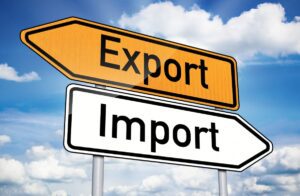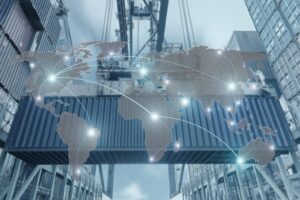Import of goods to Ukraine in % to the previous period in 2021 and 2022

SSC of Ukraine
Exports of goods in % to the previous period in 2021 and 2022

SSC of Ukraine

In response to a temporary, for a year, full trade liberalization by the EU, Ukraine is ready to abolish duties on European goods, said Deputy Minister of Economy – Trade Representative of Ukraine Taras Kachka.
“So that we can continue to talk about maintaining the zero-to-zero regime for longer than 12 months, we are ready to introduce such a mechanism now,” Kachka said during a meeting of the committee on finance, tax and customs policy on Thursday.
He added that Ukraine intends, first of all, to abolish duties on agricultural products from the EU.
The trade representative indicated that he sees the need to protect the Ukrainian market from goods from those countries with which there are no preferential terms of trade.
“The competition that we want to defend against is Turkey, China and other countries with which we do not have a preferential trade regime,” he said.
“Therefore, in order to work with the EU on a permanent customs-free trade regime, we want to take such a step. And in the context of our candidacy for the EU, this is very correct and appropriate,” Taras Kachka added.
“It is economically beneficial for us. The only industry where there is an economic imbalance is pork meat, but here it is more likely due to African swine fever, as well as cheese. We had a discussion on cheese whether the market should be protected. On the one hand, in In recent years, there has been an increase in cheese imports, mainly from Poland, but the total share of imported cheeses does not exceed 25%… There are no clear signs of harm for Ukrainian cheese producers,” Kachka explained.

On Thursday, the Verkhovna Rada Committee on Finance, Tax and Customs Policy recommended that the parliament adopt as a basis and in general government bill No. 7418 on the abolition of duties and VAT on imported goods, including cars, from July 1.
The draft document was supported by 19 committee members, four abstained.
In addition, the bill will provide for a provision allowing the government to provide mirror benefits for duties on foreign goods, where zero duties are set for similar Ukrainian items. We are talking about mutual recognition of the liberalization of the terms of trade, in particular in the EU.
As Yury Draganchuk, Deputy Minister of Finance, noted during the discussion, the government is developing a draft law on simplified customs clearance of cars through Diya.
As reported, bill No. 7418 amending the Tax Code and other laws on the return of all customs duties and VAT on imported goods, including cars. He also proposes to resume taxation, which was abolished by law No. 2142, for goods imported by single tax payers of the first and third groups, since on average the budget loses about UAH 3 billion in import duties on this benefit per month.

Ukraine expects zero rates for the export of goods to the UK to be set from June, First Deputy Prime Minister and Economy Minister Yulia Svyrydenko said after a meeting with British Secretary of State for International Trade Anne-Marie Trevelyan.
“We expect that already in early June, zero customs rates for the export of Ukrainian goods to the UK will begin to operate. This will allow Ukrainian exporters to increase the export of products,” the ministry’s press service quoted Svyrydenko as saying in a Telegram message on Friday.
“First of all, we are talking about such goods as flour, grain, dairy products, poultry meat and semi-finished products, honey, corn, sugar. As a result, we will attract additional volumes of foreign exchange earnings to the country, which will have a positive impact on macro-financial stability in the state,” the first deputy prime minister said.
During the meeting, the parties also discussed the situation with trade between the countries. In 2021, it has grown by 40%.
“In 2022, we can expect significant progress even despite the war,” the Ministry of Economy noted.
The Minister of Economy of Ukraine and the British Secretary of State for International Trade also discussed the possibility of British investments in Ukraine. Last year they reached $3 billion.
EXPORTS, GOODS, UK, ZERO RATES

JSC Ukrzaliznytsia notes a number of problems on the part of the transport system of European countries, which prevent increasing the volume of cargo transportation by rail from Ukraine to Europe.
“The set of technical problems is that the transport system of European countries is not technically ready to transport such large volumes. It needs additional rolling stock: wagons and locomotives,” Deputy Director of the Department of Commercial Work at Ukrzaliznytsia Valeriy Tkachev said at the “Economics of War: May Review and Focus on Infrastructure” conference.
According to him, today Ukrzaliznytsia transports cargo using only 2,000 wagons, or about 130,000 tonnes of cargo per day at the western border crossings, which is approximately equal to 3.8 million tonnes of cargo per month. At the same time, Ukrzaliznytsia’s own capacities allow using 3,422 railcars, or 220,000 tonnes per day.
According to the Ukrainian railway operator, the root of the problem is that the railway infrastructure of Ukraine and Europe is significantly different in gauge. And for the exchange of goods between these two infrastructures, there are only two ways: to reload at the border or to change the wagon bogie. At the same time, Ukrzaliznytsia said that there are not enough transshipment terminals.
“Besides, the most acute problem is the number of wagons on 1,435 mm European gauge track. That is, we, for our part, can transport a much larger volume of cargo, but there is a problem either with a lack of transshipment capacity, or a problem of the availability of European wagons,” Tkachev said.
He also said that there is another technical problem, which is that the infrastructure of European countries has a limited capacity, since it was built for the needs of intra-European transport.
“In Europe, the share of railway transportation of the overall structure of the transport system is 15-35%, while we have 65%. Therefore, the European infrastructure was not initially designed for such large volumes of cargo transportation by rail,” he said.
According to Tkachev, the growth rate of railway transportation is also affected by organizational issues of business, which for many years has been building supply chains towards ports and which now needs to reorient towards border railway crossings.
“Now we have already accumulated 34,000 wagons in the network, which are loaded and are waiting to cross the border,” Tkachev said.
In addition, the presence of a number of red tape procedures at the border, in particular, repetitive procedures of phytosanitary and veterinary control, significantly slows down cargo transportation.
At the same time, the growth in railway transportation continues to recover: according to Tkachev, Ukrzaliznytsia transported 416,000 tonnes of agricultural products in March, and 638,000 tonnes in April. The goal of Ukrzaliznytsia is to reach 1-1.5 million tonnes per month of export of grain products.